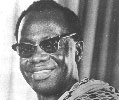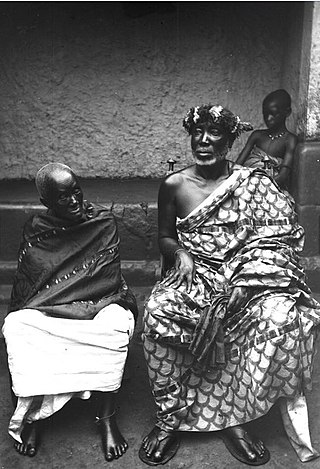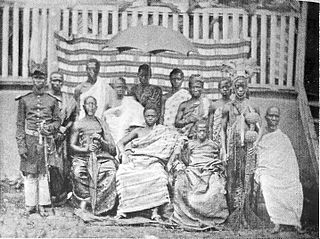Yaa Asantewaa I was the Queen Mother of Ejisu in the Ashanti Empire, now part of modern-day Ghana. She was appointed by her brother Nana Akwasi Afrane Okese, the Edwesuhene, or ruler, of Edwesu. In 1900, she led the Ashanti war also known as the War of the Golden Stool, or the Yaa Asantewaa War of Independence, against the British Empire.

Kumasi, also spelled as Comassie or Coomassie, is a city and the capital of the Kumasi Metropolitan district and the Ashanti Region of Ghana. It is the second largest city in the country, with a population of 443,981 as of the 2021 census. Kumasi is located in a rain forest region near Lake Bosomtwe and is located about 200 kilometres (120 mi) from Accra. Major ethnic groups who lived in Kumasi are the Asante, Mole-Dagbon and Ewe. The current mayor of the metropolitan is Samuel Pyne.
Adansi is a subgroup of the Akan ethnicity inhabiting the Ashanti Region of Ghana. An Adansihene is still designated. The Adansi has seven paramountcies: the capital, Fomena, New Edubiase, Ayaase, Akrokyere (Akrokerri), Akrofuom, Bodwesango and, Dompoase.

Kofi Abrefa Busia was a Ghanaian political leader and academic who was Prime Minister of Ghana from 1969 to 1972. As a leader and prime minister, he helped to restore civilian government to the country following military rule.
Kwaku Dua Panin was the eighth Asantehene of the Ashanti Empire from 25 August 1834 until his death.

The Anglo-Ashanti wars were a series of five conflicts that took place between 1824 and 1900 between the Ashanti Empire—in the Akan interior of the Gold Coast—and the British Empire and its African allies. The wars were mainly due to Ashanti attempts to maintain and enforce their imperial control over the coastal areas of present-day Ghana, where peoples such as the Fante and the Ga had come under the protection of the British. Although the Ashanti emerged victorious in some of these conflicts, the British ultimately prevailed in the fourth and fifth conflicts, resulting in the complete annexation of the Ashanti Empire by 1900.

The Asante Empire, also known as the Ashanti Empire, was an Akan state that lasted from 1701 to 1901, in what is now modern-day Ghana. It expanded from the Ashanti Region to include most of Ghana and also parts of Ivory Coast and Togo. Due to the empire's military prowess, wealth, architecture, sophisticated hierarchy and culture, the Asante Empire has been extensively studied and has more historic records written by European, primarily British, authors than any other indigenous culture of sub-Saharan Africa.

Kofi Karikari was the tenth King of the Ashanti Empire, and grandnephew of Kwaku Dua I, whose sudden death in April 1867 sparked internal strife about the succession. Kofi Karikari was chosen by an electoral majority, reigning from 28 May 1867 until his forced abdication on 26 October 1874. Karikari was the son of Afua Kobi.

Mensa Bonsu was the tenth king of the Ashanti Empire, from 1874 until his forced abdication on 8 March 1883.

The Asante, also known as Ashanti in English, are part of the Akan ethnic group and are native to the Ashanti Region of modern-day Ghana. Asantes are the last group to emerge out of the various Akan civilisations. Twi is spoken by over nine million Asante people as their native language.

The Ashantee Medal is a British campaign medal instituted on 1 June 1874. It was awarded to British, Colonial and allied native forces, under the command of Major General Sir Garnet Wolseley, who were deployed against the army of the Ashanti King Kofi Karikari, during the Third Anglo-Ashanti War, June 1873 to February 1874.
Fomena is a small town and the capital of the Adansi North District. The town is the seat of the paramount chief of the Adansi traditional council. The town is known as the place where the Fomena treaty was signed.
Juaben is a small town in the Ejisu-Juaben Municipal District, a district in the Ashanti Region of Ghana.

The history of Kumasi dates to the late 17th century when it emerged as the capital of the Ashanti Empire. Although various oral sources differ on the origin of Kumasi, majority agree it emerged as the capital of Ashanti under Osei Kofi Tutu I in the late 17th century. In the early 18th century, Kumasi was invaded and sacked by the Aowin but the invasion was curbed by Asantehene Opoku Ware I. 19th century written accounts by European visitors described the neatness and sophistication of the city. The population of Kumasi under the Ashanti Empire varies per source. The city was ransacked by the British Empire in 1874 during the Anglo-Ashanti Wars. A Civil war occurred within the 1880s which led to further decline of Kumasi. Another British invasion of the city occurred within 1895—1896 as Kumasi was left in ruins.

Friedrich Augustus Louis Ramseyer also Fritz Ramseyer was a Swiss-born Basel missionary, who was captured by the Asante in 1869 in colonial Ghana, together with his wife Rosa Louise Ramseyer, Basel mission technical staff, Johannes Kühne and French trader, Marie-Joseph Bonnat. Ramseyer was later released in 1874 and pioneered the Christian mission in Kumasi and the rest of Asante. Additionally, he spearheaded the planting of churches in Abetifi. Apart from his evangelism, Ramseyer was instrumental in the expansion of opportunities in the fields of education, artisan industry training, land acquisition for building design and manpower development in the areas he lived and worked in.
Prince Kofi Nti also known in the Caribbean as William Kofi Nti, was the son of King Karikari, the tenth Asantehene, or ruler, of the Ashanti Empire. William was added to his name when he was baptised in England. He spent many years in Trinidad before moving to Sierra Leone and later returning to England.

Nana Amoako Atta I,, was the paramount chief of Akyem Abuakwa in nineteenth century southern Ghana. Locally, his position is known as the Okyehene or Omanhene. He ruled the traditional kingdom from July 1866 to 1880 and from 1885 to 1887. After the Sagrenti War of 1874, the British declared Akyem Abuakwa a colonial possession, legally called a ‘protectorate’, as part of the Gold Coast. This development led to a clash between the old traditional Akan culture and the imposition of the new Western Christian political order.
The Bond of 1844 was an agreement signed between Fante Kings and the British government. It was signed on 6 March 1844 in Ghana, which was then known as the Gold Coast.

Ghana–United Kingdom relations are the diplomatic, historical and trade relations between Ghana and the United Kingdom. Modern state Ghana-UK relations began when Ghana became independent from the UK in 1957 as the Dominion of Ghana.

Owusu-Ansa was a prince of the Ashanti Empire. He was taken to the United Kingdom as adolescent, where he received a British education. After his return to West Africa in 1841, he first became a Methodist minister and, after his resignation from that position, a diplomat in the Ashanti Empire and the British Gold Coast. He played an important role in ending or preventing several Anglo-Ashanti conflicts.













